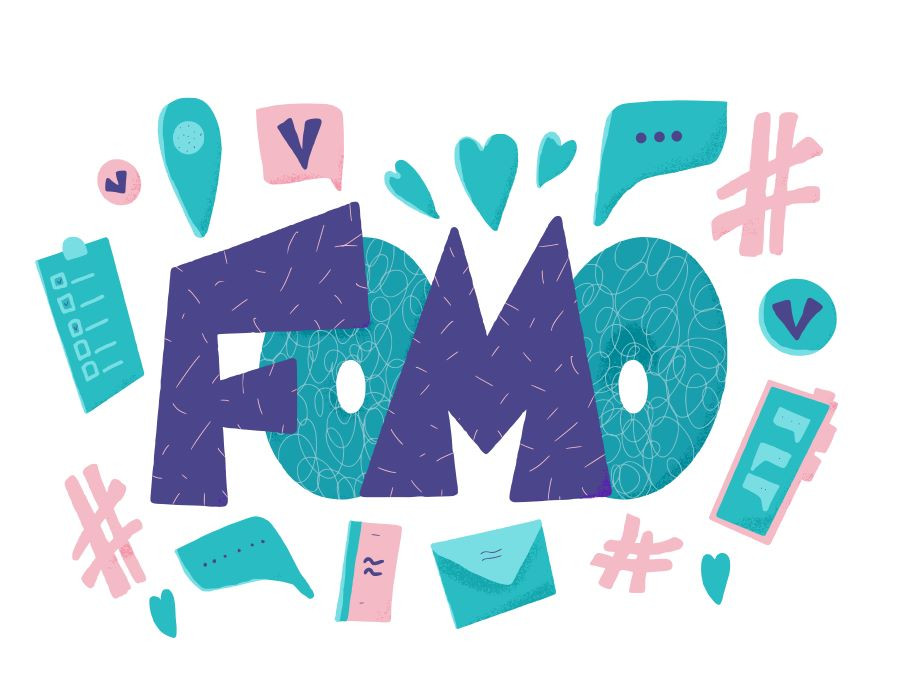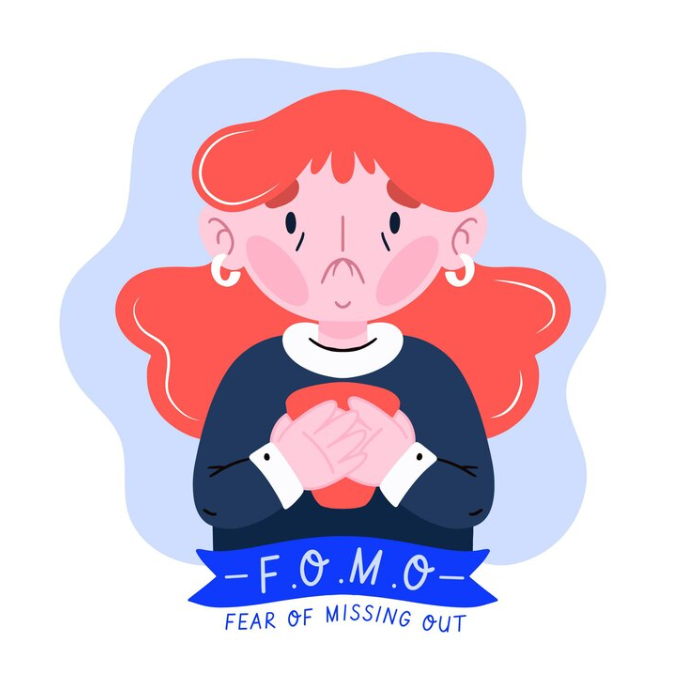How to Conquer FOMO (The Fear of Missing Out)

©️ different-1 / Freepik
In the age of hyper-connectivity, where everyone’s perfect vacation photos and exciting adventures flood our social media feeds, it’s easy to fall victim to FOMO – the fear of missing out.
This constant barrage of curated experiences can trigger a feeling of inadequacy and a desperate need to be “in the know” or participate in everything happening around us. But FOMO isn’t just harmless scrolling; it can significantly impact our happiness and well-being.
What Is FOMO and Why Does It Happen?
FOMO is a psychological phenomenon characterized by a pervasive anxiety that others might be having rewarding experiences you’re missing out on.
Social media platforms are particularly adept at cultivating FOMO. The carefully crafted highlight reels and filtered pictures create an illusion of a perfect life, leaving us feeling inadequate about our own experiences.

There are several factors that contribute to FOMO:
- Social comparison: We naturally compare ourselves to others, and social media amplifies this tendency. Seeing others’ seemingly perfect lives can make our own lives feel dull.
- Need for belonging: Humans are social creatures with a deep-seated desire to connect and belong. FOMO can stem from a fear of being excluded or left out of the loop.
- Decision-making anxiety: In a world overflowing with choices, the fear of making the wrong decision and missing out on something better can fuel FOMO.
FOMO by Age and Gender: Who Feels It Most?
FOMO can affect anyone, but research suggests some interesting trends regarding age and gender:
Age
While FOMO can strike at any age, it seems to be most prevalent among adolescents and young adults.
This is likely due to several factors. This age group is particularly sensitive to peer pressure and the need for social acceptance. They are also heavy social media users, constantly bombarded with curated feeds that can fuel feelings of inadequacy.
However, FOMO doesn’t disappear with age. While the intensity might lessen, adults can still experience FOMO related to career choices, social events, or travel opportunities.

Gender
There is no clear consensus on whether FOMO affects men or women more.
Some studies suggest a slight predisposition for females to experience FOMO, particularly in social contexts. This might be linked to societal pressures on women to maintain strong social connections and participate in social activities. However, other studies show no significant gender difference.
It’s important to remember that these are just trends, and individual experiences can vary. Factors like personality traits and social circles can play a bigger role in determining susceptibility to FOMO than age or gender.
The Downside of FOMO
While a little FOMO can motivate us to try new things, chronic FOMO can have a detrimental effect on our mental health. It can lead to:

- Anxiety and depression: The constant fear of missing out can take a toll on our mental well-being, leading to anxiety and depression.
- Low self-esteem: Comparing ourselves to others’ seemingly perfect lives can erode our self-esteem and make us feel inadequate.
- Decision paralysis: The fear of making the wrong decision can lead to indecisiveness and prevent us from enjoying the present.
- Impulsive behavior: In an attempt to avoid missing out, we might make impulsive decisions that have negative consequences.
Taking Back Control: Strategies to Combat FOMO
The good news is that FOMO can be managed. Here are some strategies to help you overcome the fear of missing out:
- Be mindful of social media: Take regular breaks from social media and curate your feed to include positive and inspiring content.
- Focus on gratitude: Practice gratitude for the good things in your own life. This can help shift your perspective and appreciate what you have.
- Live in the present: Don’t dwell on the past or worry about the future. Savor the present moment and appreciate the experiences you’re having.
- Set realistic goals: Instead of chasing fleeting trends, set realistic and achievable goals that align with your values.
- Embrace JOMO (The Joy of Missing Out): Sometimes, the best experiences are the ones we miss out on because they allow us to focus on what truly matters.
- Practice self-compassion: Be kind to yourself. You don’t have to do everything or be everywhere.
- Find your own fulfillment: Don’t define your happiness by what others are doing. Find activities and experiences that bring you genuine joy.
JOMO: Embracing the Joy of Missing Out
FOMO (fear of missing out) gets all the press, but what about JOMO – the joy of missing out?
This concept flips the script, encouraging us to find happiness by prioritizing experiences that truly matter and letting go of the pressure to be everywhere and do everything.

JOMO isn’t about social isolation or being a hermit. It’s about making conscious choices and reclaiming your time and energy. Here’s how JOMO can enrich your life:
- Reduced Stress: Saying no to events that don’t resonate with you frees up mental space and reduces the feeling of being overwhelmed.
- Deeper Connections: JOMO allows you to focus on quality time with loved ones, fostering stronger, more meaningful connections.
- Self-Discovery: Stepping away from the constant social whirl creates space for introspection and pursuing your own interests.
- Increased Productivity: By focusing on what truly matters, you can devote more energy to work, hobbies, or personal goals.
- Gratitude Boost: JOMO encourages appreciating the experiences you choose to have, fostering a sense of contentment and gratitude.
JOMO isn’t about FOMO in disguise. It’s a conscious decision to prioritize your well-being and happiness. So next time you’re faced with a social overload, ask yourself: “Does this truly spark joy?” Embrace the JOMO mindset and discover the power of missing out on the right things.
Keep in mind that you don’t have to experience everything to have a fulfilling life. Social media highlights are just a snapshot, not a reflection of reality. Focus on building meaningful connections, pursuing your passions, and appreciating the unique experiences that make up your own life. By taking control of your social media habits and cultivating a sense of gratitude, you can break free from the grip of FOMO and find true happiness.
Additional Tips
- Talk to a friend or therapist: If you struggle with FOMO, talking to a trusted friend or therapist can be helpful.
- Limit social media time: Set time limits for social media use and stick to them.
- Focus on quality over quantity: It’s better to have a few deep connections than a large collection of shallow ones.
By taking these steps, you can silence the voice of FOMO and start living a life of joy and fulfillment.
You may also like: How Strong Is the Link Between Social Media and Depression?


